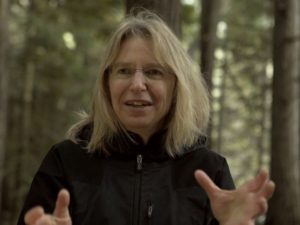今回も興味深いテーマです。
♬この木なんの木 気になる木♪ という歌がありますよね。
これを読むと本当に不思議な気持ちになりますよ
Introduction
According to Suzanne Simard, one of the world’s leading tree researchers, trees should be seen as intelligent. We talk about trees and how they can communicate and help each other as well as recognise family members.
初めに
世界有数の樹木研究者、スザンヌ・シマードによると、樹木には知性があると考えられています。私たちは、木がどのようにコミュニケーションをとり、お互いに助け合い、また家族を認識することができるかを知ることになります。
Vocabulary
family tree
drawing that shows the relationships between the different members of a family
ファミリーツリー
一族の関係を示す図
seedlings
very young plants that have grown from seeds
苗
種子から成長した非常に若い植物
offspring
someone’s children, or the young of an animal or plant
子孫
誰かの子供、または動物や植物の子供
kin
family and relatives (old-fashioned)
親族
家族・親戚(古い表現)
agency
ability to act and affect your environment
エージェンシー
行動し、環境に影響を与える能力(行為主体性)
destiny
everything that happens to someone during their life, including what will happen in the future
運命
未来に起こることも含めて、人生で起こるすべてのこと
Transcript
This might surprise you but according to some people, trees also have families. There are mother trees who support and help feed child trees.
意外かもしれませんが、木にも家族があると主張する人がいます。母親の木があって、子供の木を支え、養っているというのです。
That’s right. According to Suzanne Simard, one of the world’s leading tree researchers, trees should be seen as intelligent. They communicate with each other. They help each other. And as you mentioned, they can even tell their family members.
その通りです。樹木研究の第一人者、スザンヌ・シマードによると、樹木は知性を持つ存在であると受けとめるべきです。木はお互いにコミュニケーションをとり、お互いに助け合っています。そして、あなたが言ったように、家族に伝えることもできるのです。
Now let’s get back to that tree researcher, Suzanne Simard. Her big idea was the ‘wood wide web’ – a way of describing the network of underground roots linking trees to other trees of the same family.
さて、話を樹木研究者のスザンヌ・シマードに戻しましょう。彼女の大胆な考えは「ウッド・ワイド・ウェブ(WWW)」と呼ばれるもので、樹木が、同じ家族の他の木と結ぶ地下の根のネットワークを表現する方法です。(注:WWWは、本来、World Wide Webの略で、世界を網羅するインターネットを指す言葉)
Here’s Suzanne explaining more about tree families to BBC World Service programme, The Big Idea:
スザンヌは、BBCワールドサービスの番組、The Big Idea で、樹木のファミリーについて詳しく説明しています。
***************************************
 Suzanne Simard
Suzanne Simard
We found that the parent trees would favour those seedlings that were of their own kin versus the strangers.
スザンヌ・シマード
親の木は、同じ家系の苗と異なる家系の苗と比べてどちらを好むかを調べました。
David Edmonds
That’s extraordinary – and when you say they favour their own family members, you mean they’ll send more nutrients to their offspring than they would to, as it were, a stranger tree?
デビッド・エドモンズ
それはすごいですね。自分のファミリーメンバーを好むというのは、それが他人の木だとしたら、それよりも自分の子孫に多くの栄養を送るということですか。
Suzanne Simard
That’s right.
スザンヌ・シマード
その通りです。
***************************************
Mother trees send food and nutrients to their own seedlings – young plants that have been grown from a seed.
母の木は、自分の苗(種から育った子供の植物)に食べ物や栄養を送ります。
In this way, parent trees help their offspring – another word for their children, or young. Mother trees can recognise and feed other trees of their own kin – an old fashioned word meaning family.
このようにして、親の木は子孫、言い換えれば子供や孫の木を助けるのです。親の木は同族の木を認識することができ、養うのですす。同族は古い言葉で家族を意味します。
With the extra nutrients and carbon they receive, the offspring can extend their own root network and suck up even more nutrients…
追加の栄養分と炭素を受け取った子孫は、自分の根のネットワークを広げることができ、さらに多くの栄養分を吸い上げることができるようになり――
…which in turn increases their own growth, turning some of them into the giants we see growing in California and other parts of the world.
――その結果、自分たちの成長が促され、その中には、カリフォルニアやその他の地域で見られるような巨木へと成長するものも出てきます。
Amazing! With trees behaving in clever ways like this it’s no wonder Suzanne thinks they have intelligence.
驚きです。木がこんな風に賢く振る舞っているのだから、スザンヌが木に知性があると考えるのも無理はありません。
And that’s not all. Listen again as Suzanne discusses the question of whether trees are ‘alive’ with BBC World Service’s, The Big Idea. See if you can hear her opinion.
話はそれだけではありません。スザンヌは、BBCワールドサービスの番組、The Big Ideaで、木は「生きている」のかという疑問について議論しています。その意見を聞いてみてください。
***************************************
Suzanne Simard
Alive in the sense of having agency in their destinies, instead of being you know… I think a lot of people think of trees as just sort of like these sticks that grow out of the ground, they’re kind of these inert things that don’t have agency in their destiny, that they don’t change behaviours and make decisions but what we’re finding is that they do all that. And you know what step back and think trees have evolved over a long long long time, way longer than human beings and they have evolved in communities and they have to grow and survive.
スザンヌ・シマード
多くの人は、木は地面から生えてくる棒のようなもので、自分の運命に影響を与えず、行動を変えたり、決断したりすることのない不活性なものだと考えていると思います。しかし、一歩下がって考えを巡らすと、木は、人間なんかよりずっと長い時間をかけて進化してきたし、コミュニティの中で進化してきたし、成長して生き延びなければならなかったのです。
***************************************
I think Suzanne believes trees are alive and intelligent, because she says they have agency – a concept meaning having the ability to act and effect your environment.
スザンヌは、木が生きていて、知的であると信じていると思います。なぜなら、木にはエージェンシー(行動力があり、環境に影響を与えることができるという概念)があると言っているからです。
Dying trees even seem to know the future – before they die, they warn their offspring to start making new root connections.
枯れる木は未来を知っているようで、枯れる前に子孫に新しい根を張るように警告します。
Showing that trees have some understanding of their destiny – everything that happens in someone’s life and what will happen in the future.
樹木は自分の運命をある程度理解していることを示しています。運命は、人生で起こるすべてのことであり、将来起こることに他なりません。
So it seems that trees are much more intelligent than we thought.
つまり、木は私たちが思っているよりもずっと知的であるということです。
It’s certainly going to change how I feel about going for a walk in the woods, surrounded by all those intelligent trees chatting to each other. I wonder if they have family arguments.
森の中を散歩して、知的な木がお互いに話していると思うと、確かに気持ちが変わりますね。家族喧嘩はしないのでしょうか。



最近のコメント